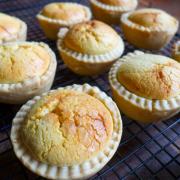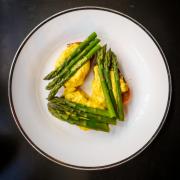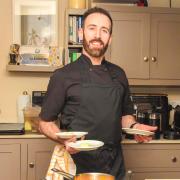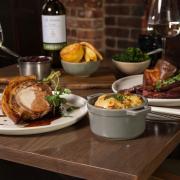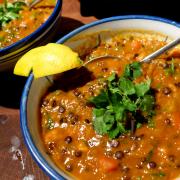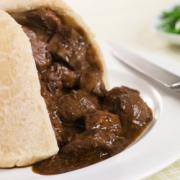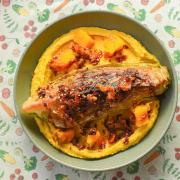For an island nation we're curiously uninspired when it comes to buying fish. Apparently the seafood us UK shoppers are most likely to sling into our shopping trolleys is salmon, tuna, cod, haddock and warm water prawns.
Nothing wrong with that, you might say, except that a good deal of it is imported (and in the case of the prawns fairly tasteless) yet we have so much amazing seafood available from our own waters. It's madness not to take advantage of what's on our doorstep, and living in Suffolk it's virtually a moral duty.
Depending on the time of year there's so much available, including skate, mackerel, sole, herring, bass, mullet, pollock, hake, langoustines, oysters and mussels. I have a weakness for luxurious lobster but I'm just as happy to stuff my face with beautiful brown crab.
And crab is what we’re cooking here. I've never been one to favour the delicate white meat at the expense of the tastier brown, so I've mixed both and added some spicy heat to make these frankly delectable pasties. Serve them with a green salad and a crisp white wine for the perfect lunch or light supper.
About Linda
Linda Duffin is a food writer who operates a cookery school, Mrs Portly’s Kitchen Classes, from her beautiful Tudor home in mid-Suffolk. Students are invited, in season, to plunder the kitchen garden and orchard in her two-and-a-half-acre garden for ingredients and can also book a stay as part of a course. Linda works closely with local producers, some of whom join her in teaching classes in their specialist areas. The Mrs Portly name, Linda says, started as a joke but she has grown into it. mrsportlyskitchen.co.uk

Devilled Crag Pasties recipe
Ingredients
About 275g mixed brown and white crab meat (2 small brown crabs)
1 tbsp each of butter and oil
3 banana shallots or 1 small onion, peeled and finely chopped
1 stick of celery, de-stringed and finely chopped
1/2 red and 1/2 green pepper, de-seeded and diced small
1 clove of garlic, peeled and crushed or finely chopped
1 tbsp plain flour
2 tspn Worcestershire sauce
1 tspn Tabasco or other hot sauce (or more, to taste)
1 tspn made English mustard
Salt and pepper
Large handful of chopped fresh coriander
Small splash of double cream
500g shortcrust pastry
1 egg, beaten with a tiny splash of water, to glaze
Method
Heat the oil and butter in a pan and fry the onion and celery gently, sprinkled with a little salt, until translucent and turning golden. Add the peppers and garlic and cook until the peppers have softened slightly.
Add both sorts of crab meat, the mustard and the Worcestershire and Tabasco sauces. Stir through the flour and add a splash of cream, just enough to bind. Cook off on a gentle heat for a couple of minutes until the mixture thickens.
Taste and season with salt, if necessary, and plenty of black pepper. Add another shake of Tabasco or a sprinkle of cayenne pepper if you'd like it hotter. It's a matter of taste but I like just enough to add piquancy and avoid blandness, without overpowering the sweetness of the crab.
Remove from the heat, stir in the chopped coriander and set aside to cool.
On a lightly floured board, roll out the pastry and use a saucer to cut four 16cm circles. Chill flat for 10-15 minutes.
Place a quarter of the crab mixture on the lower half of each circle, leaving a 2cm border. Brush the edges with water, fold the other half over and crimp tightly. It's important to make a firm seal, otherwise your filling will bubble out in the oven. Work quickly, as it's much easier to crimp if the pastry is firm.
It's up to you whether you leave the frilled edge on the side or gently turn and mould the pasties so it's running along the top like a spine. This works best with shortcrust, so if you've gone off piste and used puff, best to leave it supine. Brush with egg wash and chill again for at least 30 minutes. Overnight is fine.

You can freeze the pasties at this point for up to a month. Set them in a single layer, spaced apart. Once hard, store them well wrapped in a box. To cook from frozen, heat the oven to 190C/170 fan/ Gas Mark 5 and bake for about 45-55 minutes or until golden brown and heated through. Please watch carefully as ovens vary so much and cover them loosely with foil if they're browning too fast.
If cooking the day you make them, heat the oven to 200C/180 fan/Gas Mark 6. Brush the pasties again with egg wash and cook for about 30-35 minutes, spaced well apart, or until crisp, golden brown and piping hot. Rest them for 10 minutes before serving, or in warmer weather cool and eat at room temperature (not fridge cold, please).














